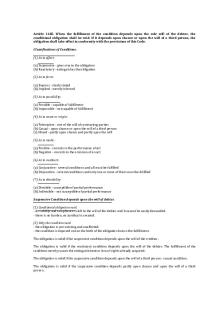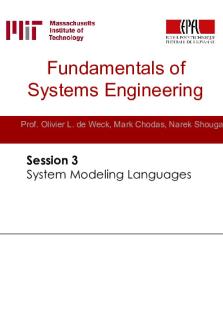Article 1182 - Lecture notes 3 PDF

| Title | Article 1182 - Lecture notes 3 |
|---|---|
| Course | Obligations and Contracts |
| Institution | Mindanao State University |
| Pages | 1 |
| File Size | 59.7 KB |
| File Type | |
| Total Downloads | 53 |
| Total Views | 156 |
Summary
Article 1182. When the fulfillment of the condition dependsconditional obligation shall be void. If it depends upon chance or upon the will of a third person, theupon the sole will of the debtor, the obligation shall take effect in conformity with the provisions of this Code. Classifications of Cond...
Description
Article 1182. When the fulfillment of the condition depends upon the sole will of the debtor, the conditional obligation shall be void. If it depends upon chance or upon the will of a third person, the obligation shall take effect in conformity with the provisions of this Code. Classifications of Conditions. (1) As to effect: (a) Suspensive - gives rise to the obligation (b) Resolutory - extinguishes the obligation (2) As to form: (a) Express - clealy stated (b) Implied - merely inferred (3) As to possibility: (a) Possible - capable of fulfillment (b) Impossible - not capable of fulfillment (4) As to cause or origin: (a) Potestative - one of the will of contracting parties (b) Casual - upon chance or upon the will of a third person (c) Mixed - partly upon chance and partly upon the will (5) As to mode: (a) Positive - consists in the performance of act (b) Negative - consists in the omission of an act (6) As to numbers: (a) Conjunctive - several conditions and all must be fulfilled (b) Disjunctive - several conditions and only one or some of them must be fulfilled (7) As to divisibility (a) Divisible - susceptible of partial performance (b) Indivisible - not susceptible of partial performance Suspensive Condition depends upon the will of debtor. (1) Conditional obligation void. - its validity and compliance is left to the will of the debtor and it cannot be easily demanded. - there is no burden, no juridical is created. (2) Only the condition void. - the obligation is pre-existing and unaffected. - the condition is imposed not on the birth of the obligation but on the fulfillment. The obligation is valid if the suspensive condition depends upon the will of the creditor. The obligation is valid if the resolutory condition depends upon the will of the debtor. The fulfillment of the condition merely causes the extinguishment or loss of rights already acquired. The obligation is valid if the suspensive condition depends upon the will of a third person - casual condition. The obligation is valid if the suspensive condition depends partly upon chance and upon the will of a third person....
Similar Free PDFs

Article 1182 - Lecture notes 3
- 1 Pages

Article - Kamaraj - Lecture notes 1
- 14 Pages

Article 101 - Lecture notes 2
- 15 Pages

Solicitud 1182 llllllll
- 2 Pages

Lecture notes, lecture 3
- 5 Pages

Lecture notes, lecture 3
- 8 Pages

Notes#3 - Lecture 3 notes
- 49 Pages

Lecture notes, lecture 3
- 59 Pages

3 - Lecture notes 3
- 7 Pages

Article 32-35 - Lecture notes 5
- 3 Pages

Lecture Notes, Lecture Exam 3
- 15 Pages

LECTURE 3 Management lecture notes
- 35 Pages
Popular Institutions
- Tinajero National High School - Annex
- Politeknik Caltex Riau
- Yokohama City University
- SGT University
- University of Al-Qadisiyah
- Divine Word College of Vigan
- Techniek College Rotterdam
- Universidade de Santiago
- Universiti Teknologi MARA Cawangan Johor Kampus Pasir Gudang
- Poltekkes Kemenkes Yogyakarta
- Baguio City National High School
- Colegio san marcos
- preparatoria uno
- Centro de Bachillerato Tecnológico Industrial y de Servicios No. 107
- Dalian Maritime University
- Quang Trung Secondary School
- Colegio Tecnológico en Informática
- Corporación Regional de Educación Superior
- Grupo CEDVA
- Dar Al Uloom University
- Centro de Estudios Preuniversitarios de la Universidad Nacional de Ingeniería
- 上智大学
- Aakash International School, Nuna Majara
- San Felipe Neri Catholic School
- Kang Chiao International School - New Taipei City
- Misamis Occidental National High School
- Institución Educativa Escuela Normal Juan Ladrilleros
- Kolehiyo ng Pantukan
- Batanes State College
- Instituto Continental
- Sekolah Menengah Kejuruan Kesehatan Kaltara (Tarakan)
- Colegio de La Inmaculada Concepcion - Cebu



